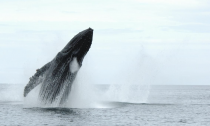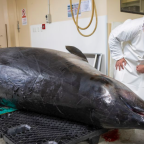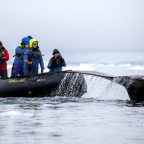
Today, whales are a beloved icon right up there with polar bears when it comes to mascots for protecting the planet. That wasn’t the case in 1966 when biologist Roger Payne came upon a dead, beached dolphin with a cigar butt carelessly shoved in its blowhole — which shocked him enough to make it his mission to “try to find out things about them that would capture the fancy of humanity,” he says in the most recent episode of NPR’s Invisibilia.
Payne’s eventual discovery that humpback whales sing, and his tireless efforts to bring those songs to as many people as he could — calling radio stations to play the record he’d made — led to restrictions on commercial whaling. Hearing whales had transformed the way humans thought of them. This episode of Invisibilia, hosted by Alix Spiegel, follows Payne’s latest efforts to elicit enough compassion to save the creatures once again, this time from climate change. In his new project, Payne is trying to translate sperm whales’ songs into a language humans can understand.
Payne’s getting help from a cast of characters featured in the episode, including noted technologist Aza Raskin. Raskin describes efforts to plot human language geometrically — turning English or German or Japanese into “a cloud of points” — noting that many languages share the same “shape.” That led to another idea: could machine learning be used to plot, and thereby understand, animal communication, too?
“What kind of shape is that? And does it fit anywhere into the universal human meaning shape? And if it does, then you start to be able to piece together a kind of Rosetta Stone,” Raskin says in the podcast. Raskin is using machine learning to decipher whale speak, which he’s working on through his nonprofit Earth Species Project.
Raskin hopes that this new endeavor will do some good for the planet and its whales. Could their “words” incite enough compassion for the creatures to spark meaningful action against the looming threat that both humans and whales face: climate change?
Making people care about climate change suffers from the distance created by the issue’s “scale and tempo,” Spiegel says — climate change is a huge issue to wrap our heads around, and it moves at a glacial pace. Finding meaning in the whales’ songs just might help with that PR problem. Payne isn’t too hopeful about the future on a warming planet for whales or for his own grandchildren, but translating these songs is his “Hail Mary” attempt at saving them, Spiegel reports.














Social Profiles